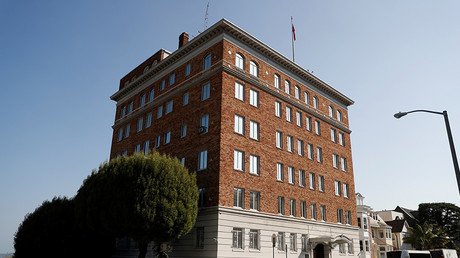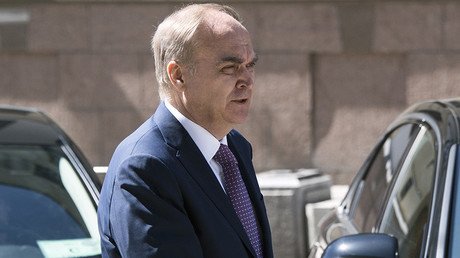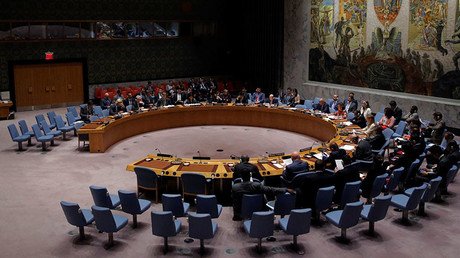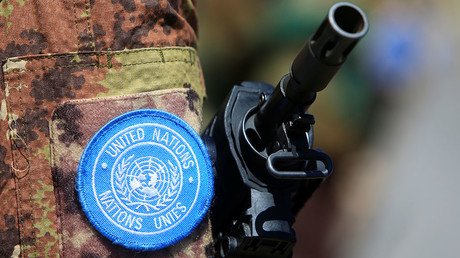Moscow has become ‘very convenient scarecrow’ for US – Russia’s UN envoy
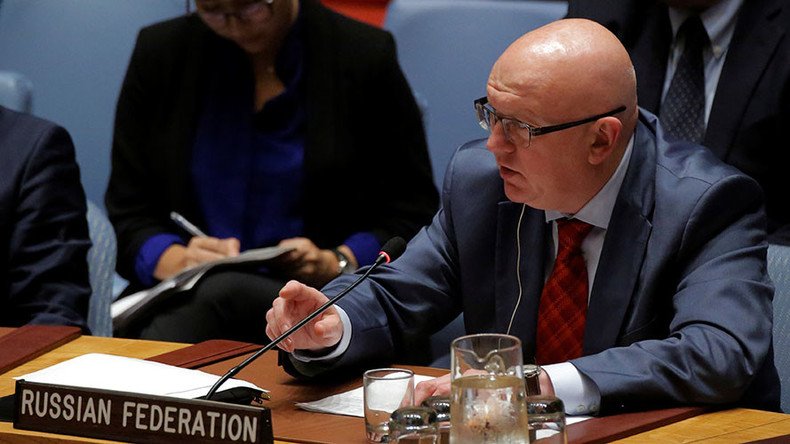
Russia has turned into a convenient bogeyman used in the internal battles raging in the US political landscape, the Russian envoy to the UN says.
Although tensions are simmering, too much hinges on the bilateral relations, with the UN Security Council remaining one of the few cooperative platforms.
“We, unfortunately, became a very convenient scarecrow, including in the domestic political battles that are raging [in the US],” Vassily Nebenzia said in an interview with RT’s Sophie Shevardnadze.
No thaw happened in the US-Russian relations with President Donald Trump coming into office due to “the domestic dimension and the political situation within the United States,” Nebenzia believes.
Relations have sunk to a new low after a series of diplomatic tit-for-tat measures, which started with the Obama administration expelling 35 Russian diplomats and denying access to the Maryland and New York compounds late last year. In August, Moscow responded by demanding a reduction in the number of US embassy and consulate staff, to which Washington retaliated and ordered three Russian diplomatic properties on its soil shuttered.
However, “too much depends on our bilateral relations, and it's not appropriate that they are so low these days and they should be improved, and that will be for the best – for the better of the world and not just our two countries,” he said.
“I will not make peace and security hostage to our bilateral relations,” Nebenzia added.
“The Security Council maybe is one of the few platforms left for us and the US to cooperate,” he said. “Hopefully, that platform that is the Security Council will help us in many things, including improving Russian-American relations.”
As to how work gets done in the Security Council despite the diplomatic standoff between the US and Russia, Nebenzia assures he has “no problem in communicating personally on good terms with any American colleague, not only Nikki Haley,” calling it “a professional camaraderie.”
With rhetoric occasionally flaring up at Security Council meetings, Nebenzia says he hadn’t engaged in a heated exchange with his colleagues.
“I think that the United Nations, and the Security Council in particular, should not be a place for futile rhetoric and a spotlight to master their rhetorical skills,” he says, adding the UN should serve its main purpose: “to maintain the international peace and security.”
“I never, never imagine that the Russian and the American people have anything like hostility towards each other. It's the political situation that is to blame, but on a personal level we are all humans, first of all, and secondly, we feel sympathy towards Americans and I feel that Americans feel sympathy towards Russians,” Nebenzia says.
North Korea: Sanctions don't work
Speaking on North Korean crisis, Nebenzia referred to Sunday’s underground hydrogen bomb test by Pyongyang as a “flagrant violation of all previous Security Council resolutions” on the state.
“Nobody, I believe, wants a military solution. Everybody wants the crisis to be resolved peacefully. But the problem is that recipes for it differ,” he says.
On Monday, the envoy called on the international community to approach the situation “in a calm and balanced manner,” rather than to be ruled by emotion. Although countries like the US, South Korea, France, Japan and the UK push for imposing further penalties against Pyongyang in order to deprive it of means to continue with a nuclear program, Nebenzia believes these aren’t effective.
“Sanctions, unfortunately, do not work. First, they are ignored, secondly, they have been long time factored in, thirdly, a new set of sanctions may be not an invitation to the negotiating table but rather to new further tests,” he said. Nebenzia also stressed that military solution should be “completely excluded.”
“We would welcome any efforts and any initiatives to start a genuine dialogue,” the envoy says, emphasizing the double-freeze plan, pushed by Russia and China.
However, the proposal for the North to suspend missile tests in exchange for a halt in joint US-South Korea drills has been slammed by his US counterpart, Nikki Haley, as “insulting,” he says.
“If she has something better than the new sanctions set, then maybe the United States could come out with it.”
As for the driving forces behind Pyongyang’s defiant actions, Nebenzia suggests it could be that “the world has shown evidence of what happened to those leaders that voluntarily gave up their nuclear programs and maybe that has also affected [North Korea] in what they are doing, which is not right in any way.”
UN peacekeepers in Ukraine won't have a political mission
Among the issues pending at the UNSC is a Russian draft resolution on establishing a UN peacekeeping mission in eastern Ukraine, which is “aimed solely at protecting the special monitoring mission of the OSCE observers at the line of actual contact.” Nebenzia also stressed the mission is “not entrusted with any political or other tasks,” since they are covered by the Special Monitoring Mission of the OSCE or the Normandy format.
Although ideas of deploying a peacekeeping mission in the country have been supported by Kiev, it didn’t support the format proposed by Russia.
Nebenzia says the Russian proposal is based on the 2015 resolution 2202, which endorses “the package of measures to implement the Minsk agreement.”
In the meantime, Kiev's previous “vague talk“ about a monitoring mission appears to be “a disguise not to implement” the Minsk deal, Nebenzia says.
On Tuesday, Russian President Vladimir Putin assigned the Foreign Ministry to submit a draft, as he considers the “presence of peacekeepers, or rather people, who would provide security for the OSCE mission, absolutely appropriate.”
READ MORE: Bashar Assad’s Deir ez-Zor victory puts illegal US presence in spotlight
Regarding whether the stance on Syria among his counterparts has been gradually changing from the “Assad must go” mantra, the envoy confirmed that even those who didn’t want to admit it reluctantly accept that “the situation on the ground is changing” and turning “for the better.”
“We need more political effort, because the solution can only be political, and we are aiming at it, and we are working on it, and, yes, the rhetoric on Syria has changed in the Security Council and the UN in general, I admit,” Nebenzia said, adding “we can see a political horizon in the Syrian crisis.”
You can watch the full interview with the Russian envoy to the UN Friday on RT’s SophieCo.
